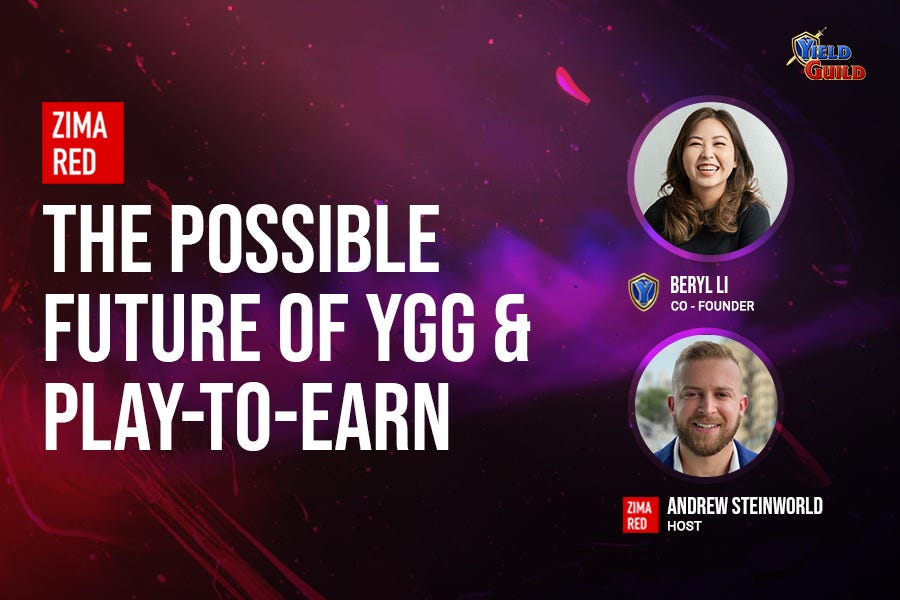Zima Red Podcast: The Possible Future of YGG and Play-to-Earn
In this podcast, Beryl Li and Andrew Steinwold discuss YGG’s possibilities of expansion into different types of Metaverse experiences.
The Zima Red podcast features interviews with prominent founders, investors, and collectors in the NFT space who shed light on the industry’s potential and how it intersects with existing sectors such as finance and gaming.
Zima Red is hosted by Andrew Steinwold, an investor from the Greater Chicago Area who is also the Managing Partner at Sfermion, the world’s first investment firm focused on non-fungible tokens and associated assets. He is also a Partner at Polynexus Capital, a multi-strategy digital asset fund that invests in distributed ledger technologies. Andrew has invested in projects such as OpenSea, Yield Guild Games (YGG), and Showtime.
In this episode, Andrew speaks with YGG co-founder Beryl Li about how YGG will expand in the long-term future and what she imagines the evolution of play-to-earn will look like. Beryl provides insights on emerging Metaverse concepts such as learn-to-earn and gamified applications where users can be incentivized for everyday activities.
The following is an excerpt from the discussion. Listen to the full episode here.
Zima Red: Beryl Li - The Evolution of Play-To-Earn
Andrew (37:13): When you're thinking about the long-term future of YGG, let's call it five to 10 years out, how do you see things playing out? How do you see YGG expanding in the future? And if you could snap your fingers and paint a picture of that future, 10 years forward, what does that look like?
Beryl (37:35): Oh, that's a very interesting question. I believe that play-to-earn will be in various forms. There's going to be a thin line between gamified applications and games themselves, where real-world activities will be digital and gamified. As an example, there'll be a new concept of learning and while you do learning activities on-chain, you earn rewards. Or it's also in the form of healthcare and exercise.
A lot of activities in the real world will move to the Metaverse, so YGG will be invested in games. When I say games, it's not only the games that we see today, it would be games or gamified applications. That actually is like work in the future. That’s how I see it progress over time, which is really interesting to see.
Andrew (38:42): So it's almost going to be like an earnings platform and also like a services platform, in some sense. Is that the rough idea?
Beryl (38:53): Yeah, there's going to be a concept of learn-to-earn, for example, where you incentivize the learning process. So maybe education will be different. It won't be in physical classrooms anymore. It might be done virtually in the Metaverse and the tokenization aspect of play-to-earn will be applied into these learn-to-earn economies.
Andrew (39:19): I want to switch gears here a little bit and talk more about the general ecosystem of play-to-earn. How do you think play-to-earn is going to evolve in the future? Do you think it's going to continue to be these processes where we're going into the game, we're doing some function, and that'll be that? Or do you think that it could evolve in a different way?
Beryl (39:49): It depends on how we actually see what play-to-earn means. But for me, it means that you do a certain activity on-chain and then you end up earning in-game rewards by doing certain activities. I feel that play-to-earn is actually going to evolve into something like learn-to-earn or you do exercise and then you earn something. There's more incentives within economies.
Andrew (40:29): That's very cool. It's not just going to be like, kind of perform X function, it's going to be perform any of these 30 functions and you're going to be able to earn value through those activities.
You can listen to the full discussion on Spotify.
- -
Follow Zima Red on Spotify to listen to all of their upcoming episodes.
Check out Beryl and Andrew’s Twitter to know more about their projects.
Join the YGG Discord or follow us on Twitter for future updates.




